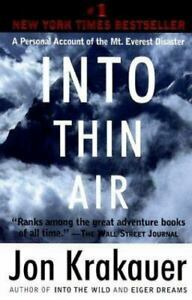You need to sign in or sign up before continuing.
Take a photo of a barcode or cover
adventurous
challenging
dark
informative
adventurous
emotional
reflective
medium-paced
I wouldn't call this a "good" read, because it's a very sad story, but an interesting one nevertheless
adventurous
challenging
dark
emotional
informative
reflective
sad
medium-paced
adventurous
informative
sad
fast-paced
Great account of how the very tall mountain is cold and murdery and maybe don't swing nuts too much, even in the Death Zone. Krakauer can write and its an addicting read. Read this instead of climbing everest, there's so much poop
adventurous
challenging
emotional
informative
reflective
sad
medium-paced
adventurous
challenging
dark
emotional
informative
reflective
sad
tense
medium-paced
What an adventure this book was. Jon Krakauer is not only an amazing mountaineer, but an even better storyteller. In this book, the accounts of the 1996 disaster in Mt. Everest come to life, and the descriptions are so vivid that you feel like you were there. What made this book so digestible, in my opinion, are the short chapters and the descriptive and easy to understand prose that the author uses, which makes this book attainable for people who know nothing about mountaineering (like me). Also, the fact that Jon was there himself adds to the credibility and liveliness of the story. Plus, he focuses not only on the actual facts, but also does a self-evaluation on his actions and how things could have gone better. Definitely left me thinking and craving for more non-fiction!
You’re stumbling down an snow gully at approximately 28,000 feet above sea level, in the midst of a hurricane that clocks in your visibility at no more than a few yards ahead. You’re operating on an empty if not nearly empty tank of oxygen and the symptoms of a possible early onset of a cerebral edema. Your air-starved brain is limited to the cognitive abilities of a slow child, and you puzzle at a collection of “unnaturally smooth, bluish rocks” in the distance before recognizing them as the tents of your camp, nestled into the side of the tallest mountain on Earth.
This is Mount Everest on day of May 10, 1996. There are truly no words to ascribe even the barest sense of the calamity that struck the eighteen summit-pushers on that harrowing day. The loss is unfathomable.
As a recovering hypochondriac with a fascination for the kinds of disasters that deign to grace true crime podcasts, over-worried mothers' dinner tables, and, God forbid, the occasional graduation ceremony keynote speech, I find that these stories are often reduced to desensitizing trauma porn or swashbuckling tales of tenacity and the insurmountable human spirit. Jon Krakauer’s account of the 1996 Mt. Everest disaster walks a precarious line between narrative and nonfiction, reminiscent of The Indifferent Stars Above or even In Cold Blood. From a haze of traumatic, fragmented memories, Krakauer masterfully builds a comprehensive account spanning back decades to the first summit push, and even before that, to the discovery of the world’s tallest peak by an Indian trigonometrist. He reconciles the shavings from all other wildly fatigued survivors struggling with their own trauma and guilt, and whittles down a story that traverses time and altitude, from Base Camp up to the summit, and back down again.
Having just been baptized in the writings of Bessel van der Folk’s The Body Keeps The Score, I was enraptured by Krakauer’s descriptions of moments so beyond the human mind’s capabilities for pain that they departed from reality:
“I observed my own slide from reality with a blend of fascination and horror. I experienced a queer detachment from my own body.”
“Confronted with this tally, my mind balked and retreated into a weird, almost robotic state of detachment. I felt emotionally anesthetized yet hyperaware, as if I had fled into a bunker deep inside my skull and was peering out through the wreckage around me in a narrow, armored slit.”
Astoundingly, I found myself empathizing with this extreme alpinist not because of the cause, but in the way we both responded to our traumatic experiences.
In Krakauer’s joyless epic, one must find joy elsewhere; I found it whenever Krakauer breathed life into a barren mountainside with the power of his pen.
“Sheer rock buttresses seamed with ice pressed in from both edges of the glaciers, rising like the shoulders of a malevolent god.”
This book feeds into larger questions that continue to perplex me: what are the limits of rationality, logic, and morality in the face of cosmic, unforgiving forces of nature? Was this disaster the result of “many little things—a slow accrual, compounding steadily and imperceptibly toward critical mass?” Or was this the display of awesome power by some scorned himalayan God?
In his recounting, Krakauer recognizes a key mistake that fabricated true reality and expounded the grief of Andy Harris’ family. Harris himself vanished into thin air, never to be seen again. We humans speak of reality as an ultimatum. Our courts judicize on the DNA analysis and timestamps, and the overabundance of data is propelling us into a new era. But what if reality disobeys all data and reason? How do people just disappear?
Sitting outside a coffee shop on a sunny day in Austin, I was affected by Tropical Storm Beryl by no more than some minor turbulence on my morning flight. Modern technology and modern practices of self care have sequestered me from powerful external forces of nature, fate, and men. Not an hour ago, having pulled a left out of a right-turn only lane right behind a state trooper, in the great god-fearing country Texas no less, I believe I exemplify what my rambunctious and delightfully contrary acupuncturist describes as an “audacious young person” by testing fate, trying my luck, and continually escaping traffic laws and insurance claims unscathed.
But have we, like the late guide Rob Hall, mistaken a few bouts of good weather as our norm? Reality on Everest defied the "reality" he created for himself and his team. In a world whose climate slowly reaches critical mass, what will become of this new “Everest”? And who will we become when tragedy strikes?
This is Mount Everest on day of May 10, 1996. There are truly no words to ascribe even the barest sense of the calamity that struck the eighteen summit-pushers on that harrowing day. The loss is unfathomable.
As a recovering hypochondriac with a fascination for the kinds of disasters that deign to grace true crime podcasts, over-worried mothers' dinner tables, and, God forbid, the occasional graduation ceremony keynote speech, I find that these stories are often reduced to desensitizing trauma porn or swashbuckling tales of tenacity and the insurmountable human spirit. Jon Krakauer’s account of the 1996 Mt. Everest disaster walks a precarious line between narrative and nonfiction, reminiscent of The Indifferent Stars Above or even In Cold Blood. From a haze of traumatic, fragmented memories, Krakauer masterfully builds a comprehensive account spanning back decades to the first summit push, and even before that, to the discovery of the world’s tallest peak by an Indian trigonometrist. He reconciles the shavings from all other wildly fatigued survivors struggling with their own trauma and guilt, and whittles down a story that traverses time and altitude, from Base Camp up to the summit, and back down again.
Having just been baptized in the writings of Bessel van der Folk’s The Body Keeps The Score, I was enraptured by Krakauer’s descriptions of moments so beyond the human mind’s capabilities for pain that they departed from reality:
“I observed my own slide from reality with a blend of fascination and horror. I experienced a queer detachment from my own body.”
“Confronted with this tally, my mind balked and retreated into a weird, almost robotic state of detachment. I felt emotionally anesthetized yet hyperaware, as if I had fled into a bunker deep inside my skull and was peering out through the wreckage around me in a narrow, armored slit.”
Astoundingly, I found myself empathizing with this extreme alpinist not because of the cause, but in the way we both responded to our traumatic experiences.
In Krakauer’s joyless epic, one must find joy elsewhere; I found it whenever Krakauer breathed life into a barren mountainside with the power of his pen.
“Sheer rock buttresses seamed with ice pressed in from both edges of the glaciers, rising like the shoulders of a malevolent god.”
This book feeds into larger questions that continue to perplex me: what are the limits of rationality, logic, and morality in the face of cosmic, unforgiving forces of nature? Was this disaster the result of “many little things—a slow accrual, compounding steadily and imperceptibly toward critical mass?” Or was this the display of awesome power by some scorned himalayan God?
In his recounting, Krakauer recognizes a key mistake that fabricated true reality and expounded the grief of Andy Harris’ family. Harris himself vanished into thin air, never to be seen again. We humans speak of reality as an ultimatum. Our courts judicize on the DNA analysis and timestamps, and the overabundance of data is propelling us into a new era. But what if reality disobeys all data and reason? How do people just disappear?
Sitting outside a coffee shop on a sunny day in Austin, I was affected by Tropical Storm Beryl by no more than some minor turbulence on my morning flight. Modern technology and modern practices of self care have sequestered me from powerful external forces of nature, fate, and men. Not an hour ago, having pulled a left out of a right-turn only lane right behind a state trooper, in the great god-fearing country Texas no less, I believe I exemplify what my rambunctious and delightfully contrary acupuncturist describes as an “audacious young person” by testing fate, trying my luck, and continually escaping traffic laws and insurance claims unscathed.
But have we, like the late guide Rob Hall, mistaken a few bouts of good weather as our norm? Reality on Everest defied the "reality" he created for himself and his team. In a world whose climate slowly reaches critical mass, what will become of this new “Everest”? And who will we become when tragedy strikes?
I didn’t finish it before my library loan expired and honestly I wasn’t engaged enough to want to re-loan it. Soft DNF, maybe I’ll read it one day when I’m in the mood!


